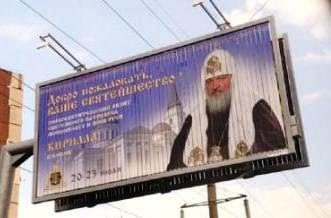 Billboards announcing Patriarch Kirill’s visit in Kyiv
Billboards announcing Patriarch Kirill’s visit in Kyiv
Patriarch Kirill of Moscow says that he and Benedict XVI often see eye-to-eye on many issues, especially with regard to those of a moral nature, according to statements reported on July 19th by Interfax as the Patriarch was about to visit Ukraine.
“The position of the present Pope, Benedict XVI leaves room for optimism,” he said in an interview on Ukrainian television channels, observing how the Pope is often criticized by “liberal theologians and the liberal mass media in the West” for his opinions. “However, in his approach on many public and moral issues, the Pope coincides fully with the approach of the Russian Orthodox Church. This gives us an opportunity to promote Christian values with the Catholic Church, in particular in international organizations and in the international arena,” he asserted.
At the same time, the patriarch discerned “dangerous phenomena” in contemporary Protestantism, in which Christians “let sinful elements of the world enter their interior and justify these elements that the secular society offers them.”
As a result, he said, “liberal secular philosophical slogans are repeated within the Protestant churches and grow roots in religious thought.” In this connection, Patriarch Kirill referred to the question of the ordination of women, which he said appears in the West because “the secular notion of human rights is incorporated to theology”.
Patriarch Kirill went on to stress the importance of the integration of both Russia and Ukraine in Europe for preserving their “national, cultural and spiritual identity” and Erurope’s too. “It is a great challenge in conditions of globalization. We must preserve the diversity and beauty of God’s world and at the same time promote good international cooperation and peaceful relations between nations.”
He said that if Russians, Ukrainians and Belorussians reject their “basic values,” they would lose their national bearings, causing “a great catastrophe of civilization, the same as with other nations that have lost their identity.”
Without their essentially Christian fundamental identity the nations of the world could be “easily manipulated, because this traditional spiritual culture in the majority of the population is the main criterion for them to distinguish good from evil.”
